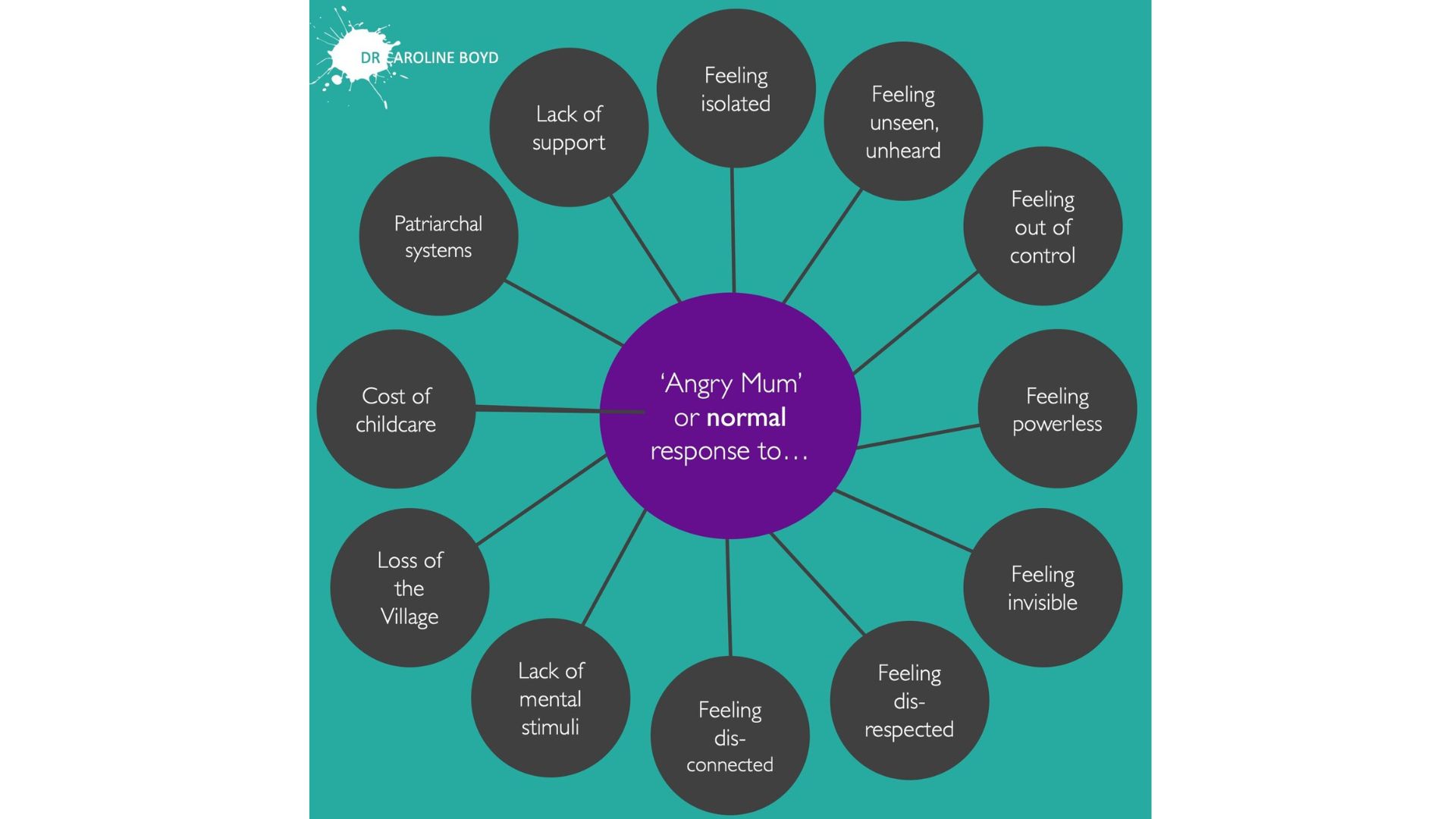"I threw my son's plate against the wall, I couldn't cope" - psychotherapist shares the 3 reasons mum rage might creep up, and the top tips to soften it


"I threw my son’s plate against the wall. I couldn’t cope anymore. The whining, the clawing, it was all too much. I felt instant relief as the plate splintered and shards flew far and wide. But that brief relief was followed by a much longer-lasting shame as my son began to cry in fear. I scared him. I scared myself."
Shouting, throwing, screaming until red in the face. We are familiar with rage in our children, the face-down tantrums, the resolutely stamped feet, and the lovingly made pasta making its way slowly down the kitchen wall. But what about when it’s us who does the throwing and the screaming? Whether it's while navigating matrescence or juggling the mental load, many mums can identify with talk of 'rage'.
Well, I’m a Psychotherapist and a mum of 3, and I can tell you with certainty, that if you’ve found yourself feeling regret and shame at witnessing your own rage spill out of you like an untamed beast, then you’re not alone. To be honest, you see that quote at the top of this article? It’s mine. And I have hundreds of similar stories that have been shared with me by other parents over the years, along with more of my own too. In fact, 93% of 700 parents who responded to my social media poll, shared that they’d experienced more rage since the pandemic. Often told through horror, shame and disbelief, I recognised something so important about each account of rage, a commonality woven through all of these stories – and it wasn’t that the mother was somehow bad or failing, but something entirely different.
Read on and wait for a wave of relief as I give you a whole new way to understand rage so that next time the red mist descends, you’ll respond in the way you need – not with shame, but with compassion.
Rage in motherhood - why do we experience it?
- You're overwhelmed
- You lack support
- Your basic needs aren't met
- You feel 'perfectionism' pressure
Contrary to popular narrative, the cause of anger and rage isn’t that you’re lacking in strength or resilience, and it isn’t that you’re flawed or failing, it’s because of one (or all) of these reasons. Let’s explore further the true cause of those explosive moments.
1. You're overwhelmed
When you’re juggling too many balls, you are functioning from a stress state. You feel heightened as your body has increased levels of the stress-hormones cortisol and adrenaline. Any further stressor, be it a tantruming child, or the relentless beeping of a washing machine demanding to be emptied, can be the straw that broke the camel’s back, finding you spilling over with frustration. This eruption of anger and rage is a sign that you’re exhausted and juggling too much.
2. You lack support
Ideally when you’re feeling frazzled, you rest. When you’re feeling depleted, you tap out and let someone else take over. But as we know, in our current culture there is not always someone to tap out to, or enough time to fully rest. And sometimes, even if there are opportunities to rest, or people to tap out to, perfectionism and the pressure to show ‘I’ve got this’ can find you sidestepping or turning down these opportunities.
GoodtoKnow Newsletter
Parenting advice, hot topics, best buys and family finance tips delivered straight to your inbox.
3. Your basic needs aren't met
If you’re not able to, or prioritising meeting your basic needs of hydration, nourishment and rest, then you’re going to find yourself closer to the edge of that stressful tipping point. For example, a dehydrated body is a stressed body, and your nervous system is going to feel more heightened and easily triggered when thirsty.
4. You feel 'perfectionism' pressure
You feel the pressure of perfectionism, people-pleasing and comparison: If you’re setting the bar of self-expectations at ‘perfection’, then you’re setting yourself up for failure. If you fear burdening others by accepting kindness or support, then it may be that people-pleasing is adding to the load.

If you’re constantly looking to other people’s filtered, front-of-house social media feeds and using what you see as a ruler against which to measure your parenting, then you’ll frequently find yourself lacking. Perfectionism, people-pleasing and comparison heap on the pressure and expectation and find you bending under the weight of it all and more likely to snap.
These are just a few of the things that increase the likelihood that you’ll join your child in their meltdown. So, the conclusion is, that next time you feel the rage rise, it’s not that you’re a bad mum, it’s that you’re a tired, under-resourced or under-rested one! Doesn’t that completely change how you respond to yourself?
Consider your child. If they have a mega meltdown, you can either approach them as a ‘naughty’ child, shaming and criticising them, or you can envelop them in a big hug, and recognise that they’re probably overtired or overstimulated. Which one will most likely result in a calmer child who feels understood? Well, it’s the same with you.
5 ways to soften feelings of rage
- Ask yourself what do you need
- Know and believe you can't do everything
- Recognise the rage bubbling up
- Give yourself compassion
- Talk it out
1. Ask yourself what do you need
Anger and rage are pointers to unexpressed and unvalidated emotion, and repeatedly unmet needs. Have you overlooked your needs in order to meet the needs of those around you? In overlooking needs and feelings, they don’t just disappear (as convenient as that would be) they build. Once you’ve acknowledged what you might need, be it some grounding deep breaths, rest, space, some kind words, some movement, an early night or some laughter, then find a big or small way to honour and meet that need.
2. Know and believe you can't do everything
Might it be that you’ve learnt that to love well, is to give yourself away until you’ve depleted yourself of all energy. In truth, love isn’t synonymous with giving yourself away until you’ve got nothing left. You can’t do everything well, you cannot be all things to all people. You cannot tick off everything on your to-do list perfectly. Cut corners, find creative ways to engage in things that feel fun and refuelling for you, even if you have to delegate, or say ‘no’ in order to make space for it.
3. Recognise the rage bubbling up
Begin to observe what is happening in your mind and body when you feel the rage rising up. You might feel like you’re full of red hot larva that erupts. Perhaps it can be bubbling away, coming out in spurts of irritation at something that wouldn’t normally bother you that much. The more aware you are of what happens before the rage spurts out, then the sooner you can ask yourself ‘what do I need right now’. This means you’re likely to find a more productive way to address the unmet needs or feelings, lessening the impact of the rage, and the resulting collateral damage of more tears and guilt. Wildly running on the spot and then doing some grounding breaths (inhale for 4, exhale for 7) can be ways to channel the adrenaline coursing through your veins, and remind your nervous system that you’re not being chased by a bear.
4. Give yourself compassion
You are not a bad mother, you’re a stretched, overwhelmed and under-resourced one. Perhaps a lonely, tired, or sad one. Anger is a normal human response to stress, a taboo one, but a normal one. Sure, it’s not ideal when the rage overspills in a destructive way, but the reasons behind this happening are deserving of compassion rather than shame. Shaming yourself shuts down the opportunity to meet needs or seek support. Shame says ‘I am a bad mother’ rather than ‘I am a good mother who is depleted and needs support’.
5. Talk it out
Verbalise hurt, confusion or resentment as these can fuel simmering rage. Whether you fire off a frenzy of Whatsapp messages to a friend, or arrange to speak to someone, thrashing those feelings out with someone who is kind and supportive adds validation to your experience and can help you feel heard and justified
What to do when it feels like it all falls apart
So, there are some ideas and ways to soften rage, or to meet the needs that fuel it, but what do you do when it all comes to a head? What do you do when the grounding breaths didn’t work, the need can’t be met quickly enough, and the rage came spilling up and over in a red-hot mess. And now everyone is crying. Clinical Psychologist Dr Becky, came onto my podcast, The Therapy Edit, and shared her warm thoughts on what to do after we lose it with our kids in this 20-minute episode. But in the meantime, here are 3 steps:
Ground yourself. Calm your mind and body by taking 10 deep breaths. This helps engage your calm, rational brain which in a moment of rage will most likely have logged offline and been replaced with your fight or flight response.
Take responsibility. Restore connection and reinstate a sense of safety for your child by taking responsibility for the rage. Yes, an element of their behaviour or the circumstances may well have triggered it, but it’s our responsibility as parents to respond in a containing and supportive way, not our child’s.
Address any resulting guilt or shame by considering how to acknowledge the need that had been overlooked. You’re not a bad mother, you are a depleted one. What do you need to help resource yourself. Some comforting words from a friend, a new tip or insight into how to respond to certain, triggering behaviours? To nudge the to-do list aside for a bit so that you can slow down and rest?
Helpful resources to use
I have hour-long workshops on ‘Mum Guilt’ and ‘Overwhelm and Burnout’ on my website. And check out my talk with Dr Becky Kennedy, below;
Dr Caroline Boyd has a website and great resource in 'reclaiming your sense of self'.

The early years of motherhood can feel the hardest, remember you're not alone if you hate playing with your kid, struggle with toy rotation or if you don't want mum friends.... you do you. And know that no matter your choices or style, we promise you're not alone in it.

Anna Mathur is a mum of three, psychotherapist and bestselling author. She's passionate about taking therapy out of the therapy room and sharing her own personal and professional experiences to support mums through motherhood. Psychoeducation is a big passion of Anna’s as she believes that knowing yourself and understanding your thoughts and feelings is a huge part of enabling change.
